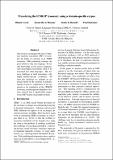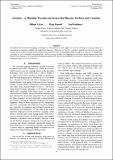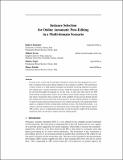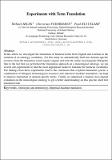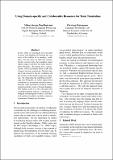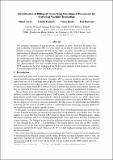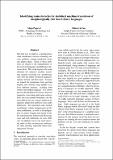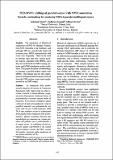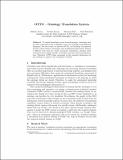Search
Now showing items 11-20 of 35
Translating the FINREP taxonomy using a domain-specific corpus
(IAMT and EAMT, 2013-09-02)
Our research investigates the use of statistical machine translation (SMT) to translate the labels of concepts in an XBRL
taxonomy. Often taxonomy concepts are
given labels in only one language. To enable knowledge access ...
Asistent -- a machine translation system for Slovene, Serbian and Croatian
(University of Ljubljana, 2016-09-29)
The META-NET research on language technologies in 2012 showed a weak support on tools for crossing the language barrier for
many European languages, including the south Slavic languages. Therefore, we describe a statistical ...
Instance selection for online automatic post-editing in a multi-domain scenario
(Association for Machine Translation in the Americas, 2016)
In recent years, several end-to-end online translation systems have been proposed to successfully incorporate human post-editing feedback in the translation workflow. The performance
of these systems in a multi-domain ...
Poor man’s lemmatisation for automatic error classification
(European Association for Machine Translation, 2015-04-11)
This paper demonstrates the possibility to
make an existing automatic error classifier for machine translations independent
from the requirement of lemmatisation.
This makes it usable also for smaller and
under-resourced ...
Experiments with term translation
(Association for Computational Linguistics, 2012-12-08)
In this article we investigate the translation of financial terms from English into German in the
isolation of an ontology vocabulary. For this study we automatically built new domain-specific
resources from the translation ...
Using domain-specific and collaborative resources for term translation
(Association for Computational Linguistics, 2012-07)
In this article we investigate the translation
of terms from English into German and vice
versa in the isolation of an ontology vocabulary. For this study we built new domainspecific resources from the translation ...
Identification of bilingual terms from monolingual documents for statistical machine translation
(Association for Computational Linguistics, 2014-08-23)
The automatic translation of domain-specific documents is often a hard task for generic Statistical Machine Translation (SMT) systems, which are not able to correctly translate the large
number of terms encountered in the ...
Identifying main obstacles for statistical machine translation of morphologically rich South Slavic languages
(European Association for Machine Translation, 2015-05-11)
The best way to improve a statistical machine translation system is to identify concrete problems causing translation errors
and address them. Many of these problems are related to the characteristics of
the involved ...
TED-MWE: a bilingual parallel corpus with MWE annotation: Towards a methodology for annotating MWEs in parallel multilingual corpora
(Accademia University Press, 2015-12-03)
The translation of Multiword expressions (MWE) by Machine Translation (MT) represents a big challenge, and although MT has considerably improved in recent years, MWE mistranslations still occur very frequently. There is ...
OTTO - ontology translation system
(CEUR-WS.org, 2015-08-11)
To enable knowledge access across languages, ontologies that
are often represented only in English, need to be translated into different
languages. For this reason, we present OTTO, an OnTology TranslatiOn
System, which ...

